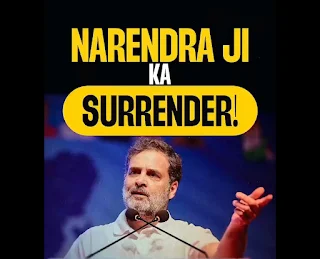New Delhi, June 5, 2025 – A single phrase, "Narender Surrender," uttered by Congress leader and Leader of the Opposition in Lok Sabha, Rahul Gandhi, has set off a political maelstrom in India, drawing sharp rebukes from the ruling Bharatiya Janata Party (BJP) and reigniting debates about nationalism, diplomacy, and political rhetoric. The controversial remark, made during a speech in Bhopal on June 3, 2025, at the launch of the Congress' *Sangathan Srijan Abhiyan*, has been labeled by critics as irresponsible and inflammatory, while Gandhi's supporters argue it underscores the BJP's alleged subservience to foreign powers.
The Context: Operation Sindoor and Geopolitical Tensions
The controversy stems from Gandhi's comments on India's recent military operation, dubbed *Operation Sindoor*, which saw Indian armed forces conduct strikes deep inside Pakistan, reportedly as far as Peshawar, in response to cross-border terrorism. The operation, hailed by many as a decisive show of strength, culminated in a ceasefire agreement between India and Pakistan, brokered in part through diplomatic channels involving the United States. According to a fact-check by the Press Information Bureau (PIB), the ceasefire was a standard de-escalation move, not a capitulation. However, Gandhi seized on reports of a phone call from U.S. President Donald Trump to Prime Minister Narendra Modi, alleging that Modi "surrendered" to American pressure.
Speaking in Bhopal, Gandhi said, "Trump made one gesture from there [the U.S.], picked up the call, and said, 'Modiji, what are you doing? Narender, surrender.' And Narendra ji immediately surrendered." He contrasted the BJP's response with the Congress-led government's defiance of U.S. pressure during the 1971 Indo-Pak War, which led to the creation of Bangladesh. In a subsequent post on X, Gandhi doubled down, stating, "A call came from Trump, and Narendra ji immediately surrendered – history is witness to this, this is the character of BJP-RSS, they always bow down."
BJP's Counteroffensive: Accusations of Treachery
The BJP wasted no time in launching a blistering counterattack. Labeling Gandhi a "Pakistani propaganda leader," the party accused him of undermining national unity at a time when India's military success was being celebrated. BJP national spokesperson Pradeep Bhandari called Gandhi's language "indecent" and questioned his patriotism, stating, "Indians see him as an agent of Pakistan." The party argued that Gandhi's remarks echoed Pakistan's narrative, particularly as they coincided with a Pakistani dossier acknowledging the depth of India's strikes during *Operation Sindoor.
BJP leaders also invoked historical context to deflect Gandhi's accusations. Posts on X from BJP supporters highlighted perceived Congress failures, such as the handling of Kashmir in 1948, the release of 90,000 Pakistani prisoners of war in 1971, and the UPA government's approach to terrorism. One user, @Its_Me_Jasraj, wrote, "Rahul Gandhi calling PM Modi 'Narendra Surrender' is the HEIGHT of irony… Congress didn't fight history – it surrendered to it."
Supporters Rally Behind Gandhi
Gandhi's remarks found resonance among Congress supporters, who viewed them as a bold critique of the BJP's foreign policy. On X, Congress-aligned voices like @SaralPatel clarified that Gandhi's comment targeted Modi personally, not India as a nation. "LoP Rahul Gandhi Ji said, 'Narendra – Surrendered.' He didn't say India. It's only blind Bhakts who think Modi is India," the post read. Supporters framed Gandhi's rhetoric as a defense of India's sovereignty, contrasting the Congress' historical defiance of superpowers with what they called the BJP's deference to foreign influence.
At the Bhopal event, Gandhi invoked the legacy of Congress leaders like Indira Gandhi, who led India to victory in 1971 despite U.S. opposition. "The lions and lionesses of Congress fight against superpowers and never bow down," he declared, rallying his base with a narrative of resilience and independence.
Critics Warn of Dangerous Precedent
Political analysts and commentators have expressed concern over the escalating rhetoric. OpIndia, in a scathing editorial, argued that Gandhi's "Narender Surrender" jibe was "not merely ill-timed; it is irresponsible, misleading, and tactically aligned with Pakistani talking points." The outlet suggested that the phrase could have been crafted in "the ISPR's propaganda cell," referring to Pakistan's military media wing. The editorial underscored the timing of Gandhi's remarks, noting that they came at a moment of national pride following *Operation Sindoor*'s success.
Rashtriya Lok Dal (RLD) leader Malook Nagar, an ally of the BJP, countered Gandhi's narrative by emphasizing Pakistan's weakened position. "Pakistan has surrendered, it's on its knees, and even begged to stop the war. If someone says the Prime Minister surrendered, what are they [saying]?" he remarked in Mumbai.
A Polarized Discourse
The "Narender Surrender" controversy highlights the deep polarization in Indian politics, where narratives of nationalism and sovereignty are fiercely contested. For the BJP, Gandhi's remarks are a gift, providing ammunition to portray him as unpatriotic and out of touch. For Congress, the phrase is a rallying cry to challenge the BJP's dominance and question its diplomatic decisions.
As the dust settles, the episode underscores the power of words in shaping public perception. Gandhi's quip, whether a calculated jab or a rhetorical misstep, has ensured that the debate over India's foreign policy and leadership will remain front and center. With both sides digging in, the "Narender Surrender" saga is unlikely to fade quietly, as India navigates a complex geopolitical landscape and an ever-divided domestic arena.














No comments: